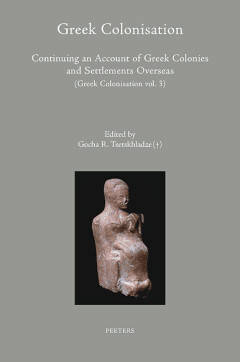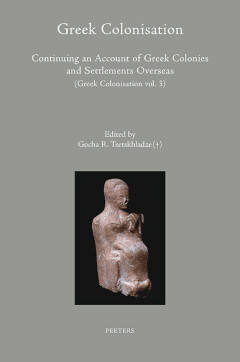
- Retrait gratuit dans votre magasin Club
- 7.000.000 titres dans notre catalogue
- Payer en toute sécurité
- Toujours un magasin près de chez vous
- Retrait gratuit dans votre magasin Club
- 7.000.0000 titres dans notre catalogue
- Payer en toute sécurité
- Toujours un magasin près de chez vous
Greek Colonisation
Continuing an Account of Greek Colonies and Settlements Overseas (Greek Colonisation Vol. 3)
Tsetskhladze G.R.
368,45 €
+ 736 points
Description
The handbook on Greek colonisation was a project that Gocha Tsetskhladze took over from Irad Malkin some 25 years ago; it yielded two excellent volumes (in 2006 and 2008), but it grew. The third volume fell victim to Gocha's heavy engagements as Director of the excavations at Pessinus in Anatolia (from 2009). The project had been intended to be of two volumes, but, after the publication of the first, it became clear that a third would be needed. This is it, though not as it might be due to Gocha's death. New chapters were recruited, old were updated, and a chapter on Miletus was rescued, enabling the main text of the volume to conclude where so much Greek colonisation began. The ten main chapters embody a variety of approaches, mixing breadth and depth: The Concept of Polis and its Application to Greek Colonies and other Greek Settlements Overseas; Greek Secondary Colonisation; Greeks between Cilicia, Tyre and the Ancient Near Eastern Hinterland: Textual Evidence and Historical Perspective; Nomads, Barbarians and Scythians: Idealisation and Cultural Difference; From Greek Colonisation to Cultural Encounters via Migration and Mobility: Historical and Methodological Considerations; The Ancient Discourse of (Archaic) Greek (Overseas) Settlements; A Short History of the Modern Framing of Archaic Greek Overseas Settlement as Colonisation; What's in a Word? Colonisation Ancient and Modern, and Some Related Problems; East Greece in the 8th-6th centuries B.C.; and Miletus - the Ionian Metropolis in the Archaic Period. Gocha died before completing his own two chapters, one on the Black Sea and the other on publications on Greek colonisation over the past 25 years. No one can fill this gap. In partial substitution, for the Black Sea, his original thoughts of 1994 and those of over 20 years later are presented as appendices; on publications, though limited to the Black Sea, his introductory piece for the proceedings of the Sixth International Congress on Black Sea Antiquities, held in 2017, is relevant and it too (mildly updated) is provided as an appendix.
Spécifications
Parties prenantes
- Auteur(s) :
- Editeur:
Contenu
- Nombre de pages :
- 708
- Langue:
- Anglais
- Collection :
- Tome:
- n° 41
Caractéristiques
- EAN:
- 9789042951310
- Date de parution :
- 31-12-24
- Format:
- Livre relié
- Format numérique:
- Genaaid
- Dimensions :
- 165 mm x 250 mm
- Poids :
- 1397 g

Les avis
Nous publions uniquement les avis qui respectent les conditions requises. Consultez nos conditions pour les avis.






